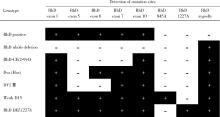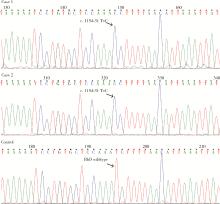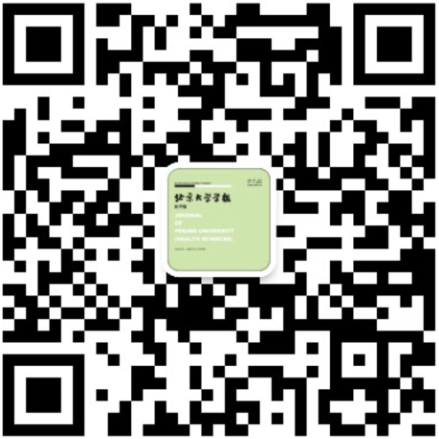北京大学学报(医学版) ›› 2024, Vol. 56 ›› Issue (2): 352-356. doi: 10.19723/j.issn.1671-167X.2024.02.024
2例罕见RhD变异型RHD*DEL37的分子生物学分析
- 北京大学第一医院输血科, 北京 100034
Molecular biology analysis of 2 rare RhD variant individuals with RHD*DEL37
Peng WANG*( ),Ziyao YANG,Meng WANG,Wei WANG,Aizhi LI
),Ziyao YANG,Meng WANG,Wei WANG,Aizhi LI
- Department of Transfusion, Peking University First Hospital, Beijing 100034, China
摘要:
Rh血型系统是输血医学中重要的常规检测血型系统, 因RhD血型不合引起的溶血性输血反应及新生儿溶血病一直以来倍受临床重视。本研究报道了2例罕见的RHD基因变异型RHD*DEL37个体的血清学和基因特征, 这2例个体的血液样本经血清学方法(试管法和微柱凝胶法)鉴定为RhD阴性。采用聚合酶链反应-序列特异性引物(polymerase chain reaction-sequence specific prime, PCR-SSP)对样本进行RHD基因分型和合子型分析, 基因分型结果为RHD基因阳性, 并排除了常见的几种RHD基因变异体的可能。RHD基因合子型检测阳性, 证明其中一条RHD等位基因1~10外显子全部缺失。进一步对样本RHD基因1~10外显子基因进行Sanger法测序, 测序结果显示在另一条等位基因第8内含子上的第1154-31号碱基发生了T>C突变, 国际输血协会(International Society of Blood Transfusion, ISBT)将该突变等位基因命名为RHD*DEL37, 表型为RhD放散型(D-elute, Del)。本研究中, 2例血清学初筛RhD阴性的样本通过分子生物学检测, 其基因型为RHD*DEL37/RHD-(RHD*01N.01)。由于这2例个体无血缘关系, 提示我国可能存在携带该基因突变的人群。本研究提示分子生物学方法可辅助鉴别血清学初筛为阴性的RhD变异体样本, 联用分子生物学方法和血清学方法在准确鉴定血型、保障患者输血安全方面有重要意义。
中图分类号:
- R446.6
| 1 | Flegel WA , Chen Q , Castilho L , et al. Molecular immunohaematology round table discussions at the AABB Annual Meeting, Orlando 2016[J]. Blood Transfus, 2018, 16 (5): 447- 456. |
| 2 | 杨光远, 朱健, 郑朝晖, 等. 浙江台州地区血清型RhD初筛阴性的血型基因分析[J]. 中国卫生检验杂志, 2022, 32 (5): 555- 558. |
| 3 | 邹彬彬, 谢毓滨, 阳智芬, 等. 湖南省RhD阴性献血人群11种红细胞血型系统基因频率及多态性研究[J]. 中国输血杂志, 2022, 35 (2): 144- 148. |
| 4 |
Zhang J , Zeng Y , Wang Y , et al. RHD genotypes in a Chinese cohort of pregnant women[J]. Front Genet, 2021, 12, 752485.
doi: 10.3389/fgene.2021.752485 |
| 5 | Ding M , Li Q , Zhang H , et al. A novel RHD (c.509T>G, p.Met170Arg) allele shows weakened D expression[J]. Transfusion, 2022, 62 (3): E17- E18. |
| 6 | Wagner FF , Mardt I , Bittner R , et al. RhD PCR of blood donors in northern Germany: Use of adsorption/elution to determine D antigen status[J]. Vox Sanguinis, 2012, 103 (Suppl 1): 15. |
| 7 | Fukumori Y , Hori Y , Ohnoki S , et al. Further analysis of Del (D-elute) using polymerase chain reaction (PCR) with RHD gene-specific primers[J]. Transfus Med, 1997, 7 (3): 227- 231. |
| 8 | 王敏, 王保龙, 蒋光明, 等. Del红细胞膜表面D抗原表位及抗原强度分析[J]. 中国输血杂志, 2011, 24 (1): 23- 26. |
| 9 | 邵超鹏, 徐华, 徐群, 等. 汉族DEL型孕妇可免去抗-D产前检查[J]. 中国输血杂志, 2010, 23 (9): 671- 674. |
| [1] | 赵曼曼,张尧,包新华. 肌阵挛癫痫伴破碎样红纤维综合征1例并文献复习[J]. 北京大学学报(医学版), 2015, 47(6): 1034-1036. |
| [2] | 张展, 贾莉婷, 张琳琳. HLA-A和HLA-B的多态性与先兆子痫(英文稿)[J]. 北京大学学报(医学版), 2009, 41(4): 418-425. |
| [3] | Nanbert ZHONG, Weina JU, Dorota MOROZIEWICZ. 等位基因特异性引物延伸法在婴儿型和幼儿型神经元蜡样质脂褐质沉积病产前诊断中的应用[J]. 北京大学学报(医学版), 2005, 37(1): 20-25. |
|
||




